Advocating for Lahaina: Jill Tokuda
Alfredo G. Evangelista | Assistant Editor | All Photos Courtesy Jill Tokuda
“With all the things I have seen, the stories I have heard, the hands I’ve held, and the moments I have shared with so many people since the fires, it has moved me, and it has changed me,” U.S. Congresswoman Jill Tokuda declares. “You can’t help but be changed by an experience like this, and while there will always be people who criticize and judge you, none of that will help Lahaina and her people. So, I respect their judgements and instead focus on doing everything I can for Lahaina, for Maui, and for Hawai‘i.” The Lahaina and Upcountry Maui wildfires thrust the Congresswoman, just seven months into her first term into the national and local limelight. Maui residents in her district perished in the Lahaina fires and also lost homes and businesses and left many others in limbo about jobs and staying on island.
Now, six months after the Lahaina fires, Tokuda continues to advocate passionately for the Lahaina fire survivors. “This was the hardest thing I’ve ever experienced as an elected official,” she says plainly. “And quite frankly, as a human being. While I was blessed not to have lost a loved one or a home, it still felt, and still is, deeply personal.”
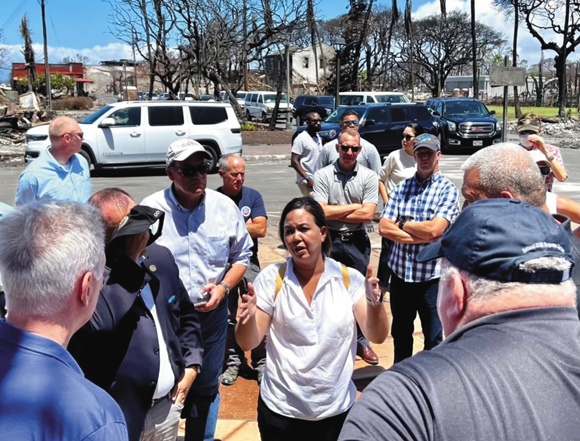
Tokuda was on the ground almost immediately after the Lahaina fire. “Within days of the fire, we put together federal resource fairs, focused on facilitating a whole-of-government response to make sure people were connected with the help they needed and working to secure the resources and support needed to ensure the immediate and long-term recovery of our Maui ‘ohana.”
Many freshman legislators can get lost in the rough and tumble of DC politics. But Tokuda is no neophyte to public service. Tokuda won a Hawai‘i State Senate in 2006, representing her native Windward O‘ahu communities of Kāne‘ohe and Kailua. In the Senate, she rose to chair the powerful Ways and Means Committee, where she was responsible for balancing the state budget and considering and approving any fiscal and tax measures moving through the Legislature. During her twelve years at the State Capitol, Tokuda also chaired the committees governing Education and Higher Education, Agriculture and Hawaiian Affairs, and Labor, as well as serving the Senate leadership as Majority Whip.
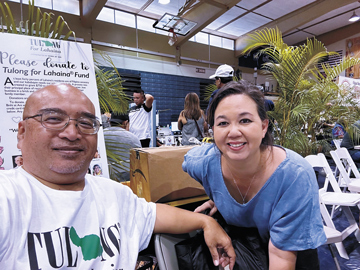
Tokuda outlined her efforts in advocating for the Lahaina fire survivors. In addition to bringing Congressional leaders to Hawai‘i (including then-House Speaker Kevin McCarthy), which aided in securing $16 billion in additional disaster funding for FEMA, Rep. Tokuda also introduced legislation and joined the others in Hawai‘i’s congressional delegation (U.S. Senators Brian Schatz and Mazie Hirono and U.S. Representative Ed Case) in requesting various federal actions, including:
• Requesting FEMA’s assistance to return West Maui students to the classroom and to facilitate the development of temporary and permanent schools in Lahaina.
• Asking President Biden to increase disaster funding request to support Maui. FEMA’s Disaster Relief Fund received an additional $16 billion in appropriations on Sept. 30th.
• Introducing a bill that would allow more taxpayers impacted by the Maui fires to deduct personal casualty losses and keep cash in their pockets.
• Introducing the Maui STRONG Act to create a grant program to help restart Maui nonprofits and small businesses that were impacted by the wildfires.
• Requesting the Department of the Interior support and prioritize environmental restoration and cultural preservation on Maui and Hawaii Island as part of the wildfire recovery efforts.
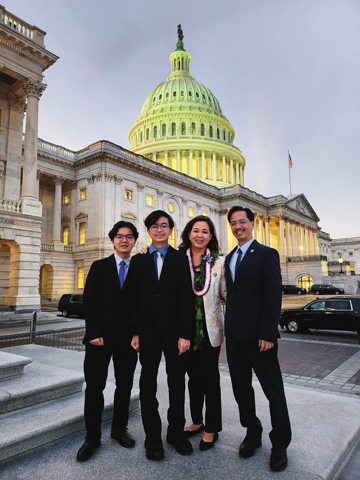
Tokuda, born and raised in Kāne‘ohe, notes she is “a proud product of Kāne‘ohe Elementary, King Intermediate, and Castle High School.” “I was the first in my family to attend college, earning my BA in International Relations and a minor in Japanese from the George Washington University in Washington DC,” she adds.
Tokuda’s family remains important for her busy life. “I am blessed to have a wonderful family that has supported me through all of my public and private endeavors,” she notes firmly. “My husband Kyle Michibata is my rock and has been my best friend since we were twelve years old. Our sons Matt (15) and Aden (14) now attend the same schools we went to as students, King Intermediate and Castle High School.” And she adds, “Each week that I go home, I am also eagerly greeted by our chiweenie, Bailey.”
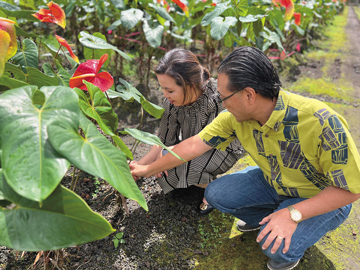
Having such strong family ties shapes Tokuda’s focus. “My focus in Congress has always been, and remains, making sure that our keiki and families can see a future for themselves in Hawai‘i. That means prioritizing actions and policies that help to make Hawai‘i more affordable for keiki to kūpuna so they can live and thrive at home,” Tokuda asserts. “This includes expanding access to health and mental health services, building more housing people can afford, reducing food insecurity, bringing down the cost of living, protecting our environment, and increasing access to education and job opportunities.”
Tokuda observes this long list has been affected by the fires. “Sadly, these challenges and issues existed long before the fires, and since then, have been exacerbated in all of our communities.”
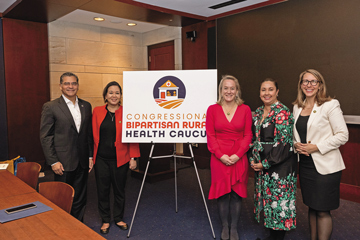
Her time as a college student in DC apparently fueled her desire to enter government service. But Tokuda’s experience includes running her own businesses and serving in nonprofit organizations, including an executive position with the Nisei Veterans Memorial Center on Maui. During the pandemic, Tokuda worked with the state, counties and nonprofit entities to track the progress of over $21 billion in federal relief that came to Hawai‘i as well as supporting the management and distribution of those resources.
Currently, Tokuda sits on the House Committee on Agriculture, the House Committee on Armed Services and is on the Special Select Subcommittee on the Coronavirus Pandemic. Tokuda is happy with her assignments. “It was particularly important for me to serve on the agriculture committee during this Congress as we are negotiating a Farm Bill that only comes around every five years, and it was critical that Hawai‘i have a seat at the table as we consider where resources and support will go for the next five years.”
Tokuda also highlights the importance of the military in Hawai‘i and the communities in Windward and rural O‘ahu, and the neighbor islands that she represents. “Given the military presence in our state and the need to make sure national security is balanced with community needs and priorities, it was important for me to serve on the armed services committee to represent the views of our constituents.”
Serving the people is Tokuda’s priority and she understands the frustrations of people. “First of all, there can always be improvement and for the sake of those we serve, we must always strive to do better.” One of the criticisms of the response to the disaster was the duplicity/volume of forms needed by the survivors to receive assistance, such as a different form for FEMA, a different form for SBA, and a different form for the Red Cross, requiring the survivors to shuttle back and forth between agencies, many without vehicles and convenient transportation and all likely suffering different ranges of emotional stress.
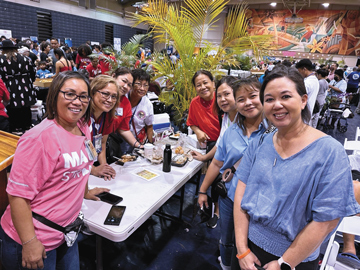
“I completely agree that we must reduce the paperwork and bureaucracy when it comes to quickly getting help to victims of disaster,” Tokuda agrees. “While our office has been helping navigate the system, the long-term solution really is to reduce inefficiencies. That is why I am proud to be a cosponsor and a strong advocate for the Disaster Survivor Fairness Act, which would streamline federal benefits for disaster survivors, including by creating a universal application for federal agencies.”
Tokuda is aware of the heroic response by the different levels of government. “Our federal, state, and county partners were the first on the scene pulling people to safety, and many of them have never left, even when the disaster impacted them personally. Responding to this crisis will take generations, and our ability to effectively meet the needs of our people and rebuild Lahaina, rests with our ability to communicate with each other and be prepared to take action swiftly to keep progress moving.”
Although Tokuda’s job requires her presence in Washington, D.C., she has made it a priority to have her Congressional staff present on Maui by holding regular weekly office hours in Lahaina. “I have been working hard to make sure we not only have a continuous physical presence on island so that we can be responsive to resident and community needs, but we have also been maintaining contact with officials at all levels of government to ensure we are working together to help rebuild Lahaina,” she maintains.
But Rep. Tokuda also recognizes the reality that the process of rebuilding Lahaina will be a complicated one. “How Lahaina is rebuilt and what it looks like in the future, must be a vision created by her people,” Tokuda concludes. “Before we start mapping out tax map keys and roadways, talking about setbacks and easements, the community must first come together and talk about a once in generations opportunity to build back their community better. Stronger. Once that vision is set, then it will be about planning to make that vision a reality. These will not be easy conversations or decisions. And it must be one that takes into account many seemingly conflicting things, like zoning and building requirements, and affordability and expediency so we can quickly get people into homes and back on their land.”
Tokuda understands this will not be easy. “In order for this to work, there needs to be a willingness to be flexible and to compromise on all sides, and to remain focused on our collective vision for Lahaina’s future.”
But before that can happen, the time-consuming task of tending to the environmental problems caused by the fire remains at hand. “Environmental cleanup and remediation, unfortunately, will take time,” Tokuda observes. “And it is something we do not want rushed and potentially creating larger environmental problems for us later. This is not to say we do not act with urgency, but rather, our focus must be on doing it right and well.”
The environmental concerns are multiple. “In the case of debris removal and remediation, we are talking about making sure the air we breathe is clean, the water we drink is safe, the land we walk on and grow food on is free of toxins, and our ocean ecosystem is healthy,” Tokuda clarifies. “Especially as we are able to lean on federal partners like FEMA, the Environmental Protection Agency (EPA), and the Army Corps of Engineers, it is important for us to do this right.”
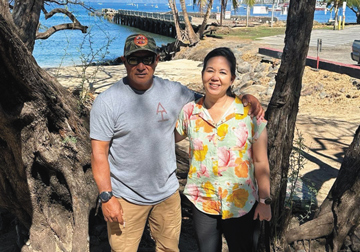
But with thousands still temporarily housed in hotels, Tokuda understands there is an urgency to act. “As I’ve said before during my speeches on the House floor, we must act with urgency to get shovels in the ground and build more permanent housing units to give our residents and families the stability they need.” Tokuda recounts joining with other members of Hawai‘i’s congressional delegation in writing to the Secretary of Homeland Security to request FEMA build 1,000 temporary housing units on Maui for displaced residents. “We need to continue to push on all federal, state, county and private sector partners that can and must play a role in quickly building housing options and working with service providers to get people into these homes.”
Tokuda is also mindful of the need to focus on the homeowner’s mortgage problems. “It is also critical that while we focus on housing, we do everything we can to support mortgage holders as many struggle to balance payments while facing a long and uncertain future,” Tokuda emphasizes. “Innovative strategies like land banking or land trusts need to be seriously considered, in addition to making available mortgage and financial counseling and support services.”
The effects of the Lahaina fires on Maui are wide-ranging, which Tokuda understands. “The economic impacts of the fire have been and are severe. After listening to small business owners struggling to start back up, I introduced our Maui STRONG Act, which would provide $30 million in grants to small businesses and nonprofit organizations on Maui. While we are still working to get it passed and funded, the idea is already being considered by other members of Congress as a means to help small businesses in their community deal with disaster.”
The response to the fires, however, is only part of Tokuda’s legislative responsibilities. After a local legislative tenure enjoying supermajorities in the Hawai‘i State Legislature, Democrat Tokuda faced a much different dynamic in the U.S. Congress. In Washington, D.C., with just a few votes between the Republicans as the majority party and the Democrats as the minority party, she understands the necessity of reaching across the aisle to develop relationships to legislate for the common good. Last year, together with Diana Harshbarger, a Republican Congresswoman from Tennessee, she launched the Bipartisan Rural Health Caucus, now consisting of forty-nine Republicans and Democrats. The Caucus works to highlight healthcare challenges across rural America and advocate for better access to quality, affordable care and strengthen the healthcare workforce and delivery pipeline. “Where you live and how much you make should not determine the level of access and care you and your loved ones receive,” Tokuda explains. “I am working hard to make this a priority of Congress to make sure all Americans get the healthcare they need.”
Rep. Tokuda also lists a number of measures she has sponsored:
• Keep Kūpuna Fed Act: ensures access to SNAP food benefits despite future COLA adjustments to Social Security benefits.
• Crisis Assistance and Resources in Emergencies (CARE) for First Responders Act: increases access to mental health and other resources for emergency and other first responders, and disaster relief workers and volunteers.
• Protecting Family Legacies Act: amends the Hawaiian Homes Commission Act to reduce the blood quantum successorship qualifications from one-quarter to one-thirty-second.
• Grow Your Own Food Act: Creates microgrants for food security.
• Thrifty Food Plan: studies to accurately account for disparities in food costs between urban and rural parts of Hawai‘i and to adjust Thrifty Food Plan benefits for neighbor island residents.
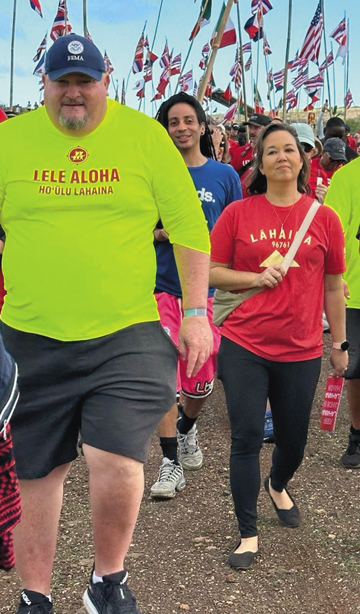
Healthcare, agriculture, military affairs, constituent service, and the Maui wildfires easily fill Tokuda’s plate and attention. But her understanding of kuleana and the Aloha spirit keeps her true to her purpose. “Following the fires, I committed to deliver a ‘Maui Minute’ each week that Congress is in session to make sure my colleagues and our federal government never forgets the shared responsibility it has to help us recover and rebuild. It’s been six months since the fires happened, and in that time, we’ve had other disasters strike and a war break out,” Tokuda recounts. “At the same time I gave my first ‘Maui Minute’ speech, my friend and colleague Representative Doug LaMalfa who represents Paradise, California, stood up to talk about the rebuilding of his community five years after their disastrous fire.”
Tokuda says that was a turning point. “It was at that moment I realized this is our responsibility and our duty to make sure our people and communities don’t get left behind no matter what else is happening in the world. Since then, I’ve uplifted the experiences of survivors, first responders, those still living in hotels, and those working on the ground to recover and begin to rebuild. I’ve talked about the impacts on business, agriculture, and the rebuilding of our schools. I’ve said much and will say more, always reminding those listening that Lahaina is not Lahaina without her people, and that at the end of the day, Aloha Always Wins.”
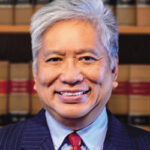 Alfredo G. Evangelista is a graduate of Maui High School (1976), the University of Southern California (1980), and the University of California at Los Angeles School of Law (1983). He is a sole practitioner at Law Offices of Alfredo Evangelista, A Limited Liability Law Company, concentrating in estate planning, business start-up and consultation and nonprofit corporations. He has been practicing law for 40 years (since 1983) and returned home in 2010 to be with his family and to marry his high school sweetheart, the former Basilia Tumacder Idica.
Alfredo G. Evangelista is a graduate of Maui High School (1976), the University of Southern California (1980), and the University of California at Los Angeles School of Law (1983). He is a sole practitioner at Law Offices of Alfredo Evangelista, A Limited Liability Law Company, concentrating in estate planning, business start-up and consultation and nonprofit corporations. He has been practicing law for 40 years (since 1983) and returned home in 2010 to be with his family and to marry his high school sweetheart, the former Basilia Tumacder Idica.
